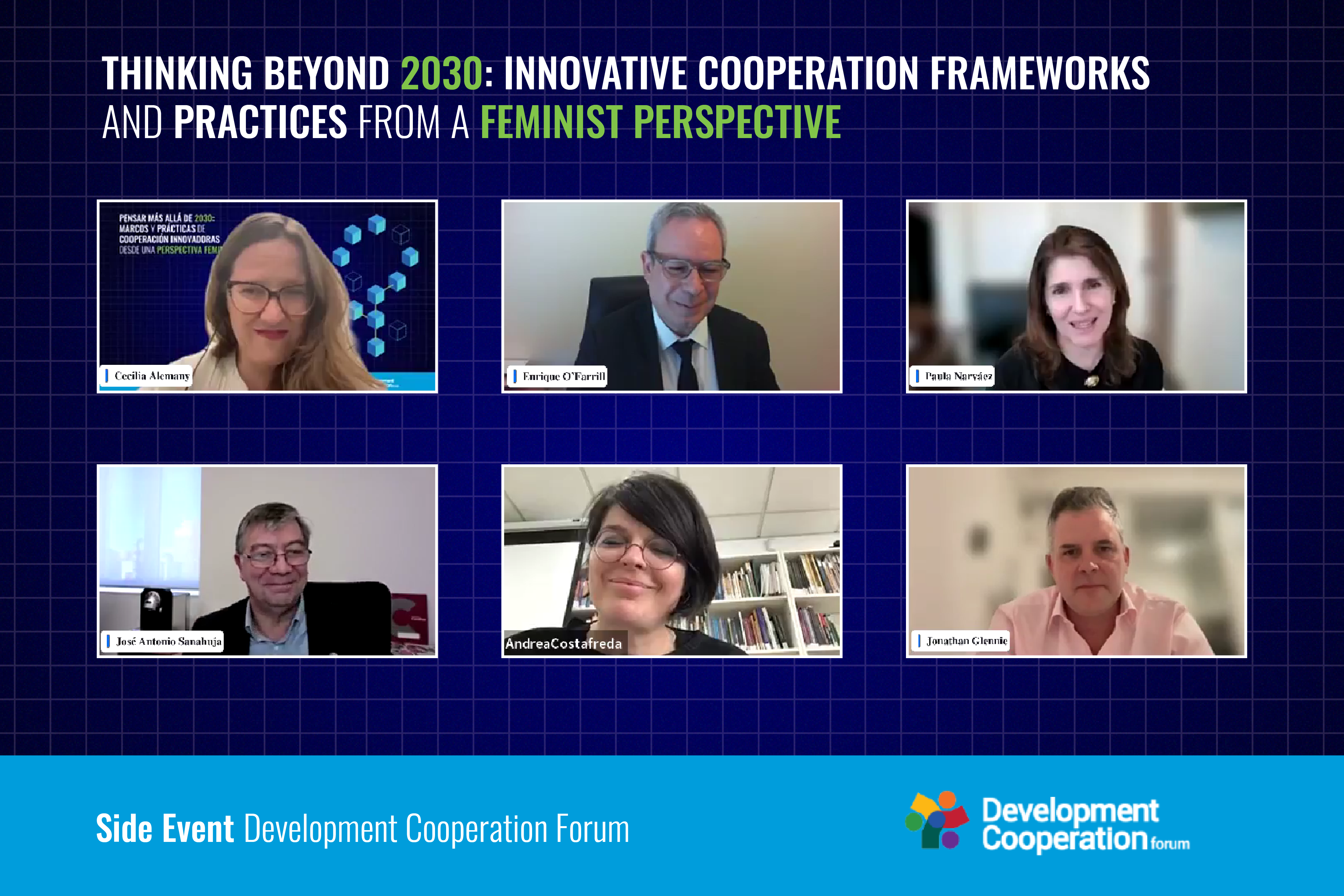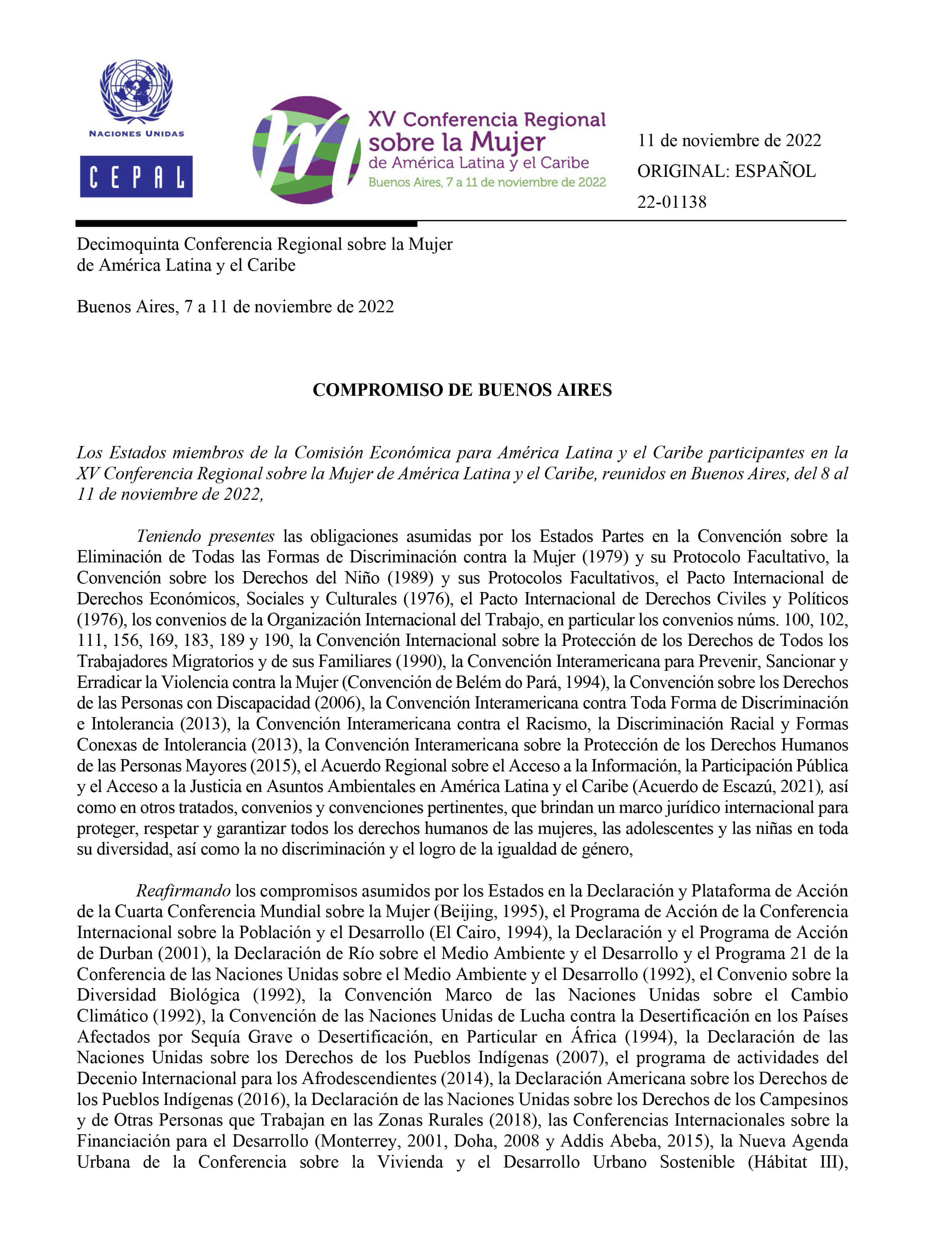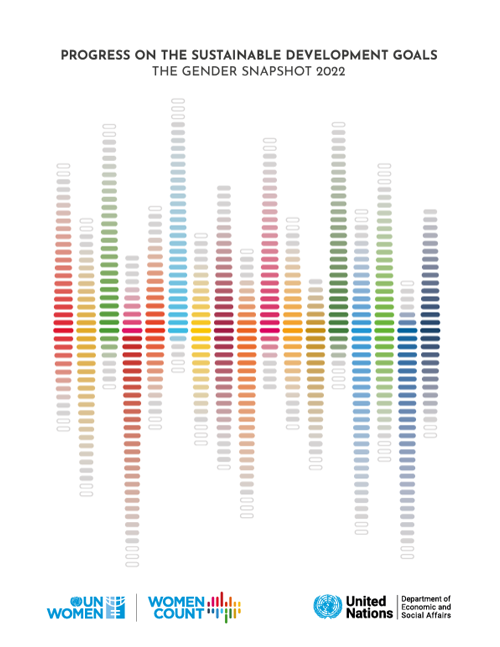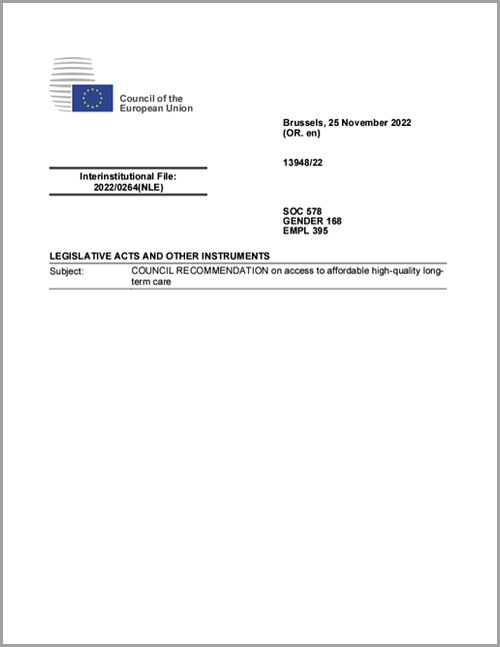Thinking beyond 2030: Innovative cooperation frameworks and practices from a feminist perspective.
Date:

Only seven years remain until 2030, the date agreed upon by the United Nations to make the Sustainable Development Goals effective. According to the progress achieved and the evident rollback, whether due to adverse contexts or lack of political will, it is clear that, at the current pace, many of them will not be achieved.
The Gender Snapshot (2022) report produced by UN Women and the UN Department of Economic and Social Affairs (DESA) concludes that if everything remains the same, the necessary investments are not made, and efforts to advance equality are not strengthened, globally it will take 286 more years to eliminate discriminatory laws and overcome the existing gaps in the legal protection of women and girls.
This is why a growing number of voices are calling for a rethinking of governance and the basic concepts of international cooperation and for the transformation of a system that has proven to be insufficient to address the transformations in development cooperation and the climate, health, and humanitarian crises as well as the inequality gaps that persist in terms of gender.
This was the theme of conversation during the forum "Thinking beyond 2030: Innovative cooperation frameworks and practices from a feminist perspective", held in a hybrid form (virtual/face-to-face) as a side event of the Development Cooperation Forum within ECOSOC in New York between March 14 and 15 of this year.
Co-organized by the Government of Chile, the Chilean Agency for Development Cooperation (AGCID), UN Women, Global Nation, and the Carolina Foundation, "Thinking beyond 2030" convened leading voices from governments, international organizations, international cooperation agencies, and civil society.
The purpose was to discuss new approaches, illustrate the practices and criticisms promoted, and identify innovative cooperation practices and their achievements, in addition to giving visibility to the importance of cooperation for achieving the SDGs, especially a substantial advance in the women's rights agenda.
The importance of integrating a feminist and gender equality perspective and the initiatives linked to the climate agenda were also expressed, an urgent action that cannot be postponed for a transformation that will impact society.
"The demand here is 'let's allocate resources where we place the discourse.' This dissociation, so eloquent and permanent and vivid for the communities themselves, impacts the credibility of the international and cooperation systems. It is essential to be more consistent and to generate this reflection", said Paula Narváez, Chilean Ambassador to the UN and moderator of the conversation.
UN Women Deputy Regional Director for the Americas and the Caribbean, Cecilia Alemany, called on cooperation in general to prioritize donations towards feminist organizations and support for public institutions responsible for the equality agenda and warned about the deficient proportion of official development assistance (ODA) that goes directly to women's civil society organizations and women's ministries or authorities, since in 2020-2021 it represented less than 1% of total ODA.
She stressed that although in the past South-South cooperation has not generated significant initiatives focused on gender equality, "a new generation of South-South and triangular cooperation initiatives are emerging, from Latin America and in collaboration with Spain, that bring this new agenda, which seeks to transform social protection from the perspective of care and solutions addressing gender-based violence, and to innovate in frameworks and practices."
Andrea Costafreda, director of Oxfam Intermón's Program for Latin America and the Caribbean, advocated a new conception that contributes to overcoming the often still "colonialist" vision of international cooperation.
"From donors, from cooperation, it is necessary to incorporate these new critical epistemologies, which come from ecofeminisms, from feminist economics, from de-colonialisms, which come from the South, which allow us to relate in different ways with the knowledge and sentiments, from the South," said Costafreda.
For his part, José Antonio Sanahuja, director of the Carolina Foundation, referred to the role that governments must assume to address these challenges, especially in developed countries, such as Spain, where the Law on Cooperation for Sustainable Development and Global Solidarity has just been enacted.
On the new Cooperation Law, Sanahuja emphasized several important aspects for Latin America and the Caribbean. First, that "it begins with the concept of development in transition" -promoted a few years ago by Chile, Uruguay, ECLAC, the OECD Development Center, and the European Commission and that it reinforces "Spain's legal commitment to allocate 0, 7% of GDP to Official Development Assistance (ODA)", "cooperation will no longer be tied to per capita GDP metrics, and Spain will thus continue to cooperate with countries in transition, as are many of the countries of Latin America and the Caribbean," said Sanahuja.
It should also be noted that the new law mainstreamed the concept of gender equality and promoted feminist cooperation. "Development is a global problem and proposes parameters that are not universally applicable. However, we have global challenges, so we need shared responses," said Sanahuja.
Jonathan Glennie, the co-founder of Global Nation, stressed that the COVID-19 pandemic demonstrated the need and importance of strong public investments to overcome the gravest problems the world faces; but this financing is not at any cost and must be managed in a way that is coherent with the 2030 Agenda. Glennie suggested that the Global Public Investment approach would provide a more horizontal, fair, and effective system of cooperation than the current outdated model.
"In this context of poly-crisis, more resources, capacities, and expertise are needed to implement the 2030 Agenda for Sustainable Development, as well as a more horizontal, transparent, and representative cooperation system. We need more international public investment - much more than we currently have - but it's not just about quantity; it's also about quality," said Glennie.
In the same regard, Enrique O'Farrill, director of the Chilean Agency for Development Cooperation (AGCID), stated that "there is an urgent need to accelerate the triple transition: technological, economic and socio-ecological," said O'Farrill, while noting that this transition is not intended to replace but is complementary to other development models.
This triple transition, O'Farrill said, "must consider international cooperation as a central axis. This region and the countries in transition need technical cooperation and other tailor-made tools in what we have called tous azimuts cooperation and can now redefine as circular cooperation.
The main recommendations presented at the "Thinking Beyond 2030" Forum were:
-
Recognize that the gender equality agenda remains a pending achievement worldwide but that it has even greater structural barriers in developing countries. Hence, it is essential to continue strengthening cooperation (in all its forms) with gender equality as its main objective.
-
Call on the entire cooperation system to support and finance women's and feminist organizations and gender institutions as a condition for the advancement of SDG 5 and the 2030 Agenda, which receive less than 1% of ODA.
-
Ensure that feminist and women's organizations participate in the debates and definitions of cooperation from design to evaluation and that their voices and proposals are integrated into decision-making.
-
Promote more circular and triangular cooperation initiatives that place the gender equality and triple transition agenda at the center without diminishing the necessary cooperation for social cohesion.
-
Ensure that the EU-LAC bi-regional agenda and new EU regional and national cooperation programs in the region's countries do not dilute the social and gender equality agenda or initiatives for social cohesion.
-
Advance a bi-regional care agreement in the framework of the EU-CELAC Summit in 2023 based on the European Care Strategy and the Buenos Aires commitment towards a care society (LINK).
-
Continue advancing the debate on the need to overcome the metrics of ODA measurement, development in transition, the need to maintain and adapt cooperation with countries in transition, and expand the concept of circular cooperation as an alternative to overcome the traditional concepts of recipient-donor already surpassed by reality. In this sense, the concept of Global Public Investment (GPI) is being cocreated to make the case that international public finance has a critical role to play in tackling the climate emergency, preparing for the next pandemic, and financing the Sustainable Development Goals. We need a concrete system of meeting our global ambitions through long-term, reliable investment in the goods, capital and infrastructure they require.
"Thinking beyond 2030" was thus a productive space to discuss these new approaches in greater depth. The event was followed by a large online audience, who had the opportunity to ask questions and interact with the panelists. The recording can be viewed at this link.


